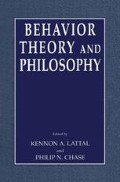Abstract
Determinism is the view that all natural phenomena are products of interrelated antecedent processes. It is a guiding assumption of scientific inquiry and there is no controversy in asserting that behaviorists subscribe to determinism in the same way as other scientists. Because human action takes place in the same physical universe as all other phenomena, behaviorists have no objection to determinism, and, for the behaviorist, determinism does nothing to undermine the richness, individuality, and complexity of the human experience. There are implications of determinism and of the use of the word determined, however, that need to be carefully considered and addressed.
Access this chapter
Tax calculation will be finalised at checkout
Purchases are for personal use only
Preview
Unable to display preview. Download preview PDF.
References
Baer, D. (1976). The organism as host. Human Development, 19, 87–98.
Black, M. (1973). Some aversive responses to a would-be reinforcer. In H. Wheeler (Ed.), Beyond the punitive society (pp. 125–134). London: Wildwood House.
Chiesa, M. (1994). Radical behaviorism: The philosophy and the science. Boston: Authors Cooperative.
Dennett, D. C. (1984). Elbow room: The varieties of free will worth wanting. Cambridge, MA: MIT Press.
Hineline, P. (1980). The language of behavior analysis: Its community, its functions, and its limitations. Behaviorism, 8, 67–86.
Hobart, R. E. (1934). Free will as involving determination and inconceivable without it. Mind: A quarterly review, 43, 1–27.
Midgley, M. (1991). The origin of ethics. In P. Singer (Ed.), A companion to ethics (pp. 3–13). Oxford: Blackwell.
Neuringer, A. (1986). Can people behave “randomly?”: The role of feedback. Journal of Experimental Psychology: General, 115(1), 62–75.
Newman, B., Reinecke, D. R., & Kurtz, A. L. (1996). Why be moral: Humanist and behavioral perspectives. The Behavior Analyst, 19 (2), 273–280.
Page, S., & Neuringer, A. (1985). Variability is an operant. Journal of Experimental Psychology: Animal Behavior Processes, 11(3), 429–452.
Sheldon, B. (1982). Behaviour modification: Theory, practice, and philosophy. London: Tavistock.
Shorter Oxford English Dictionary (3rd ed.). (1988). London: Guild Publishing.
Skinner, B. F. (1972). A lecture on “having” a poem. In B. F. Skinner Cumulative record: A selection of papers (3rd ed.), (pp. 345–355). New York: Appleton-Century-Crofts.
Skinner, B. F. (1971). Beyond Freedom and Dignity. New York: Knopf.
Skinner, B. F. (1974). About Behaviorism. London: Jonathan Cape.
Strawson, G. (1998, June 26). Luck swallows everything: Can our sense of free will be true? Times Literary Supplement, 8–10.
Wilson, E. (1979). The mental as physical. London: Routledge.
Young, R. (1991). The implications of determinism. In P. Singer (Ed.), A companion to ethics (pp. 534–542). Oxford: Blackwell.
Author information
Authors and Affiliations
Editor information
Editors and Affiliations
Rights and permissions
Copyright information
© 2003 Springer Science+Business Media New York
About this chapter
Cite this chapter
Chiesa, M. (2003). Implications of Determinism. In: Lattal, K.A., Chase, P.N. (eds) Behavior Theory and Philosophy. Springer, Boston, MA. https://doi.org/10.1007/978-1-4757-4590-0_13
Download citation
DOI: https://doi.org/10.1007/978-1-4757-4590-0_13
Publisher Name: Springer, Boston, MA
Print ISBN: 978-1-4419-3405-5
Online ISBN: 978-1-4757-4590-0
eBook Packages: Springer Book Archive

